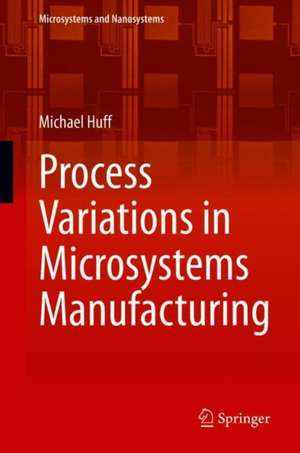Process Variations in Microsystems Manufacturing: Microsystems and Nanosystems
Autor Michael Huffen Limba Engleză Hardback – 10 apr 2020
Preț: 962.49 lei
Preț vechi: 1173.77 lei
-18% Nou
Puncte Express: 1444
Preț estimativ în valută:
184.17€ • 192.78$ • 153.29£
184.17€ • 192.78$ • 153.29£
Carte tipărită la comandă
Livrare economică 31 martie-14 aprilie
Preluare comenzi: 021 569.72.76
Specificații
ISBN-13: 9783030405588
ISBN-10: 3030405583
Ilustrații: XIX, 521 p. 236 illus., 24 illus. in color.
Dimensiuni: 155 x 235 mm
Greutate: 0.93 kg
Ediția:1st ed. 2020
Editura: Springer International Publishing
Colecția Springer
Seria Microsystems and Nanosystems
Locul publicării:Cham, Switzerland
ISBN-10: 3030405583
Ilustrații: XIX, 521 p. 236 illus., 24 illus. in color.
Dimensiuni: 155 x 235 mm
Greutate: 0.93 kg
Ediția:1st ed. 2020
Editura: Springer International Publishing
Colecția Springer
Seria Microsystems and Nanosystems
Locul publicării:Cham, Switzerland
Cuprins
Introduction.- Overview of Microsystems Manufacturing.- Process Variations in Microsystems Processing Steps.- Microsystems Metrology Methods and Associated Errors.- Process Integration and Variations in Material Properties.- Device Parameter Variations in Microsystems Manufacturing.- Quality Assurance and Control Methods Used in Microsystems Manufacturing.- Design Methods for Handling Process Variations.- Future Methods for Improved Microsystems Manufacturing Process Variations.
Notă biografică
Michael A. Huff, Ph.D., is Founder and Director of the MEMS & Nanotechnology Exchange (MNX) in Reston, Virginia. The MNX was established as a national-level program to provide access to MEMS implementation resources as well as to develop manufacturing techniques to help advance the technology. Dr. Huff has actively participated in MEMS research and development for over twenty-five years, has published numerous papers on MEMS devices and fabrication technologies, and holds more than a dozen patents and has several others pending. He has held a variety of notable positions, from industry to academia. Prior to establishing the MNX, Dr. Huff was on the faculty in the Department of Electrical Engineering at Case Western Reserve University (CWRU) in Cleveland, Ohio. Before joining the faculty at CWRU, he held the position of Technical Fellow at the Baxter Healthcare Corporation and directed Baxter's corporate-wide efforts in applying MEMS technology to novel medical devices. Dr.Huff received an M.S. in Electrical Engineering and Computer Science and simultaneously the M.S. in Material Science and Engineering with a specialization in Electronic Materials and a Ph.D. in Electrical Engineering and Computer Science from the Massachusetts Institute of Technology.
Textul de pe ultima copertă
This book thoroughly examines and explains the basic processing steps used in MEMS fabrication (both integrated circuit and specialized micro machining processing steps. The book places an emphasis on the process variations in the device dimensions resulting from these commonly used processing steps. This will be followed by coverage of commonly used metrology methods, process integration and variations in material properties, device parameter variations, quality assurance and control methods, and design methods for handling process variations. A detailed analysis of future methods for improved microsystems manufacturing is also included. This book is a valuable resource for practitioners, researchers and engineers working in the field as well as students at either the undergraduate or graduate level.
- Examines and explains the basic processing steps used in MEMS fabrication;
- Illustrates best practices and lessons learned in manufacturingof microsystems for commercial products with detailed case studies;
- Reviews future methods that may provide for improved process variations.
Caracteristici
Examines and explains the basic processing steps used in MEMS fabrication Illustrates best practices and lessons learned in manufacturing of microsystems for commercial products with detailed case studies Reviews future methods that may provide for improved process variations








